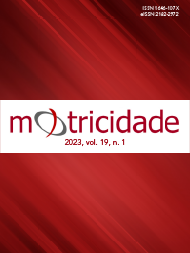Scientific evidence of factors that may affect sports performance in Paralympic powerlifting: a scoping review
DOI:
https://doi.org/10.6063/motricidade.27678Keywords:
Sports training, Performance, Paralympic Sport, Disabled Athletes, Paralympic powerliftingAbstract
The objective of this research is to point out the studies that describe variables that are associated with a positive impact on competitive performance in paralympic powerlifting athletes. The Preferred Reporting Items for Systematic Reviews and Meta-Analyses Extension for Scoping Reviews (PRISMA-ScR) guidelines were used to develop the study, and the studies were extracted from electronic databases such as Web of Science, PubMed, Scopus, ScienceDirect and EBSCO. A selection process was carried out by title, abstract and full text, according to the inclusion and exclusion criteria. Initially, 154 studies were identified. After eliminating duplicates and applying the inclusion criteria, 8 original articles were selected for qualitative analysis. The results indicate that there are physiological and biomechanical factors related to sports performance. Placebo intake, use of creatine monohydrate, lean body mass percentage, genetic predisposition, and various short- and medium-term recovery methods, such as dry needling and cold water immersion, are physiological factors related to performance. Regarding biomechanical factors, it was evidenced that the measurement of bar grip is related to greater force production and average propulsive speed.
Downloads
Published
Issue
Section
License
The authors of submitted manuscripts must transfer the full copyright to Journal Motricidade / Sílabas Didáticas Editions. Granting copyright permission allows the publication and dissemination of the article in printed or electronic formats, and copyrights start at the moment the manuscript is accepted for publication. It also allows Journal Motricidade to use and commercialise the article in terms of licensing, lending or selling its content to indexation/abstracts databases and other entities.
According to the terms of the Creative Commons licence, authors may reproduce a reasonable number of copies for personal or professional purposes, but without any economic gain. SHERPA/RoMEO allows authors to post a final digital copy (post-printing version) of the article on their websites or on their institutions' scientific repository.


